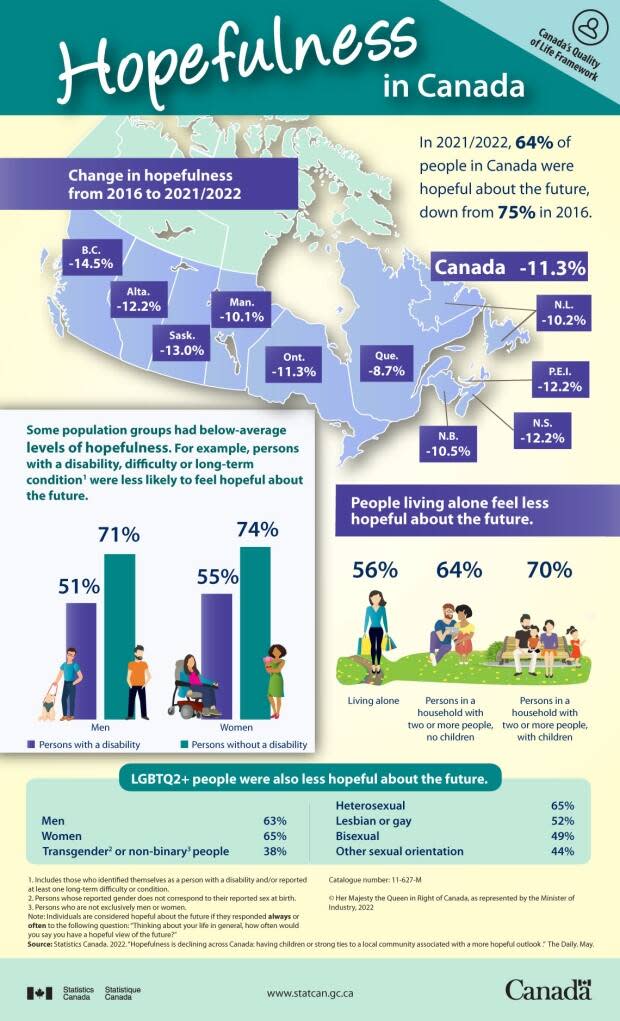Sask. residents' level of hopefulness for future drops, but higher than national average: StatsCan

A new Statistics Canada survey says the level of hopefulness Canadians have about the future has dropped in the past five years — but Saskatchewan residents are more hopeful than Canadians on average.
The Statistics Canada report, released this week and based on data from the agency's Canadian Social Survey, says that in 2021-22, 64 per cent of Canadians reported feeling hopeful about the future, down from 75 per cent in 2016.
The latest percentage was slightly higher in Saskatchewan, where 65.3 per cent of people said they felt hopeful, according to the report.
Only Quebec, at 70.3 per cent, and Prince Edward Island, at 65.8 per cent, had a higher percentage of hopeful residents.
However, Saskatchewan's latest number dropped 13 percentage points from the 78 per cent in the province who reported feeling hopeful in 2016.
Statistics Canada analyst Filsan Hujaleh notes the last few years have been "challenging" for Canadians.
"People now have to contend with inflation — food, housing, gasoline are all becoming less affordable for most people," Hujaleh said.
The Statistics Canada report also notes that the period between 2016 and 2021-22 included the start of the COVID-19 pandemic, "with most individuals and families having to cope with rapidly changing circumstances, challenging situations, and uncertainty about the future."
The Canadian Social Survey, which provided the data in the latest report, collects information on a range of social topics, such as health, well-being, and the impacts of COVID-19, Statistics Canada says.
Data was collected in three waves, ranging from August 2021 to March of this year, with data pooled to bring the sample size close to 30,000. The survey has a margin of error of plus or minus three per cent, 19 times out of 20.
Around 1,650 people in Saskatchewan were surveyed with the question, "Thinking about your life in general how often would you say you have a hopeful view of the future?"
Drop in hopefulness in young people
The survey found that younger Canadians are experiencing a decline in levels of hopefulness.
In 2016, nearly 80 per cent of Canadians surveyed in the 15 to 34 age range said they were always or often hopeful about the future, compared with 70 per cent aged 65 and older.
But in the latest survey, the younger group was about as hopeful as other Canadians, with about 63 per cent of 15- to 34 year-olds reporting a positive view of the future, Statistics Canada said.
"This finding coincides with a steady decline in mental health among youth," the report said.
But Ikenna Nwoko, a graduate studies student in electronic systems engineering at the University of Regina, is among those who does feel hopeful.
"I'm hopeful about the future because … I know Saskatchewan is also looking for people to settle in Canada," Nwoko said. He hopes he will be able to build his career in the province after graduation.
Elizabeth Primitivo, a justice student at the U of R, is on the neutral side of hopefulness.
"Two years ago, we didn't expect this pandemic and here we are kind of making the best of it," Primitivo said.

Some population groups had below-average levels of hopefulness, according to the survey.
Only 49 per cent of lesbian, gay, bisexual, transgender, questioning and two-spirit people reported a positive outlook on the future.
And just 53 per cent of people living with a disability, difficulty or long-term condition said they had a hopeful outlook on the future.
In general, women (at 65 per cent) held a slightly more hopeful view of the future than men (63 per cent) in the latest survey, Statistics Canada said. However, transgender and non-binary people "were considerably less hopeful about their futures," at 38 per cent.

 Yahoo Movies
Yahoo Movies 
